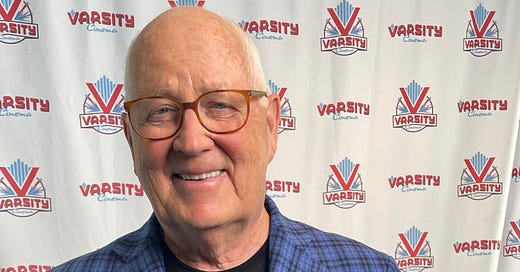The story of our lottery fraud goes global
A fascinating new documentary on the 15-year-old “Hot Lotto” scandal that happened in Iowa debuts today, June 3, free on YouTube.
DES MOINES, Iowa – A fascinating documentary about a $16.5 million lottery fraud case that happened in Iowa 15 years ago debuts at 9 a.m. CDT today, June 3, free and worldwide, on the YouTube platform on the internet.
And it’s intended to remain available and free on YouTube deep into the future, according to former Iowa Lottery CEO Terry Rich, one of the executive producers of the documentary.
You can access it at by following this link.
“My job now is getting people to watch it,” the 72-year-old Rich, now living in the suburb Waukee, said Monday with a big smile, after he’d given media and former state officials a preview of the documentary at the Varsity Cinema in Des Moines.
Terry Rich
Rich is well-suited to build an audience. He is widely-known as one of the most skilled promoters in the state.
His successes have included getting the centennial celebration of his tiny hometown of Cooper, Iowa (then pop. 50), featured on Johnny Carson’s NBC-TV “Tonight Show” in 1981; helping bring cable television to much of Iowa in the ’80s and ’90s; helping save and then expand the Blank Park Zoo in Des Moines, and then spending a decade growing the Iowa Lottery after being appointed CEO by Gov. Chet Culver in 2009, then reappointed by Gov. Terry Branstad and reappointed for a third term by current Gov. Kim Reynolds.
Titled “Jackpot: America’s Biggest Lotto Scam,” the new 50-minute story on the lottery fraud was researched, written and videoed by AMS Pictures. That’s a Dallas, TX-based media company that is 40 years old and has done about 50 other documentaries on a wide variety of people and events.
For this one, AMS writer/producer/director Brad Osborne masterfully combed through the extensive Iowa media coverage of the case. And he could refer to two books written about it after it was resolved. Those were “The $80 Billion Gamble,” by Terry Rich and former Des Moines Register reporter Perry Beeman, published in May of 2019, and “The Winning Ticket: Uncovering America’s Biggest Lottery Scam,” published in May of 2022 by Rob Sand, who prosecuted the case for the Iowa Attorney General’s office. Sand, as most readers know, went on to become the current State Auditor and he is now running for Governor as a Democrat.
Former Iowa Gov. Terry Branstad reminded those at the documentary’s media preview that he “had vetoed the lottery twice before I finally approved a new form of it.” He said he allowed it only after emphasizing that it “has to be operated with all the safeguards to protect the integrity of the State of Iowa. And I think it has been.” He said the aggressive prosecution of the lottery fraud case was an example of that.
The highly-complicated case began when a winning ticket was sold for a multi-state lottery game called “Hot Lotto” on Dec. 23, 2010, at a Quik Trip convenience store, just off Interstate Highway 80-35 in northern Des Moines. The total payoff was indeed supposed to be $16.5 million.
But no one came forward to present the winning ticket or tickets and claim the jackpot – until two hours before the deadline was to pass one year later. Then two lawyers from Des Moines came to Iowa Lottery headquarters, claiming they represented other lawyers in Texas, New York City and Quebec City, Canada – all supposedly associated with a trust fund supposedly based in the nation Belize in Central America.
“It stunk!” as Rich was quoted later by media.
After five years of investigation by Iowa Lottery officials, the Iowa Division of Criminal Investigation and the Iowa Attorney General’s staff, 51-year-old Edward Tipton, the chief of security for the Multi-State Lottery Association, was arrested on January 15, 2015, and charged with fraud. He’d been ingeniously rigging the computer systems that served the various state lotteries, so he could occasionally tell associates what numbers to play, and what dates to play them in what states. He produced jackpots of varying sizes for family or friends in five states, maybe six.
Eddie Tipton, during a 2017 court appearance. (Photo from TV videotape)
“It was an inside job!” Rich says in exasperation in the documentary, and adding later: “It was the biggest lottery fraud in American history.”
Tipton was convicted in Iowa District Court, but that conviction was later overturned by the Iowa Supreme Court, which held the prosecution had exceeded the statute of limitations.
But Sand continued to investigate and build the case and in 2017 – when Tipton faced new overwhelming evidence of what he’d done – he confessed and pleaded guilty. He was sentenced to 25 years in prison. He served about five years in the Clarinda Correctional Facility in southwest Iowa, then was released on parole.
Now about 62, he is reported to be living on a farm or ranch outside Flatonia, Texas, pop. 1,371, located on Interstate Highway 10 midway between San Antonio and Houston.
Most Iowans will find this documentary to be the clearest, easiest-to-understand reporting they’ve seen yet on the whole big, complex case.
It even comes with some humor. For example, Eddie Tipton and his brother Tommy Tipton, one of the financial beneficiaries of some of the criminal computing, are known as avid hunters of “Bigfoot,” the ape-like creature that some think roams the Colorado wilderness. And the rotund Eddie Tipton, while buying the “winning” Hot Lotto tickets in Des Moines in 2010, takes time to buy two hotdogs, too.
Rob Sand, the prosecutor, at the media preview of the documental on June 2.
Another thing to watch for is whether this documentary unintentionally winds up generating more interest in Rob Sand’s gubernatorial campaign. His relentless prosecution of the case has long been praised by most state officials.
Even now at 42 years old, he is still boyish-looking.
When he first shows up in the documentary as the Assistant Attorney General taking over the case, he was 31 years old and really looks young. Terry Rich is quoted there, after meeting Sand for the first time, “This guy is in high school, isn’t he? What’s going on?”
On Monday, after Sand had taken part in the media preview, I asked him if hearing remarks like that bothered him.
“No, I’m used to it,” he said. “I’ve never minded.”
Might it even help him in his campaign now?
“I think it might,” he said. “People are thinking it’s time for a new generation.”
If you watch the credits at the end of the documentary, you’ll see another photo of the younger Sand. Terry Rich is quoted there, telling what Sand is doing now, including running for governor, and adds, “It is unknown whether he still gets carded for beer.”
I asked Sand what he thinks about that line, too.
“Accurate,” he said.
By the way, in those credits, Rich himself is said to be “retired and he tells this crazy story (about the lottery fraud) as a keynote speaker around the globe,” which he has indeed been doing. And his credit line then adds: “He does not get carded for beer.”
A promotional card touting the documentary. (AMS Pictures)
--
You can comment on this column below or write the columnist directly by email at chuck@offenburger.com.
--
Have you explored the variety of writers, plus Letters from Iowans, in the Iowa Writers’ Collaborative? They are from around the state and contribute commentary and feature stories of interest to those who care about Iowa. Please consider a paid subscription. It helps keep them going, and it keeps you in the know.









My favorite podcast is "Criminal," hosted by Phoebe Judge. Episode #282, "Hot Lotto," from 2024, could be an excellent side note on the new documentary, which I look forward to watching. Thanks, Chuck.